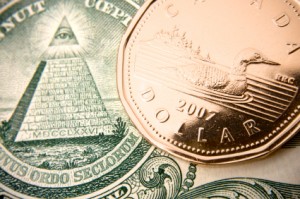Why Hard Trust is Gained from Soft Skills
 I was in Toronto. Barely glancing at a $10 bill, I thought, “Ha—they misspelled the word ‘dollar,’ those silly Canadians.”
I was in Toronto. Barely glancing at a $10 bill, I thought, “Ha—they misspelled the word ‘dollar,’ those silly Canadians.”
An instant later, I realized the fault was mine, not Canada’s. But before that realization happened–I had made a judgment. And much trust works that same way.
Think hard data causes trust? Think again. Hard trust is gained from soft skills.
The Myth of Rational Trust
Based on 14,000 takers of the Trust Quotient self-assessment test, we can confidently say most businesspeople overrate the importance of credibility in establishing trust. In practice if not in theory, they believe they can induce trust through PowerPoint. The fact is, more expertise ≠ more trust.
Most also believe that trust takes a long time to build and only a moment to destroy. In fact, trust takes about as long to destroy as it took to build—the time for each is a function of the depth of trust involved.
Both these beliefs—over-stating credibility and misunderstanding the speed of trust—are part of what I’ll call the Myth of Rational Trust. Simply stated, the myth says:
“The decision to trust is a conscious and cognitive process of weighing risks and returns, seeking the option most suited to increase the present value benefits of the one potentially doing the trusting.”
And monkeys fly.
How People Really Trust
People make decisions to trust, or not to trust, well before cognition can show up on the scene. Consider my immediate judgment that the Royal Canadian Mint had neglected to use spellcheck on its currency.
We make many trust decisions not on the basis of analytical criteria, but on the more autonomic instincts of whether something accords with deeply ingrained habits. Is he frowning or smiling? Is he holding out his hand to shake mine? Is ‘dollar’ spelled with one L or two?
Who was I to believe—my spelling instincts, honed since elementary school, or the Canadian government, with whom I have far less experience? It was, pardon the pun, a no-brainer. I’m a very good speller; and I trust my instincts. Just like you do. And if that meant Canadians couldn’t spell, I was for an instant willing to conclude that must be the case.
That is how the brain comes to trust. In the case of currencies, the rational mind can quickly step in and say, “Wait a minute, are you kidding–how likely is that!? Does not compute. Hey, lying eyes, go take another look at that loonie bill.”
Easy enough when it comes to currencies. But what happens when it comes to more complex phenomena? How do we come to trust in nurses, in salespeople—in politicians and institutions?
Lessons for Trusting
I recently saw an online comment to an economist’s article. It started out, “I am open-minded, but when I got to your second sentence about the Bush tax cuts I quit reading—you are obviously a fool.”
Not open-minded at all—but neither are most of us. We all have opinions on the issues du jour, and we dangerously tend to read only those who agree with us.
Which suggests that very few people’s minds are changed by confrontation with disconfirming data.
Instead, they are changed by the deeply-ingrained instincts we have come to rely on.
Personal Trust
In the personal-trust arena, our TQ research shows that the “intimacy” factor is the strongest of the four in the trust equation. Whether someone feels safe and secure sharing information with you is more powerful than your hard-won credentials, fancy slides and long list of past clients. The saying, “People don’t care what you know until they know that you care” is not some idle sales line; it is deeply grounded in psychology.
A recent Wired story (Why Brains Get Creeped Out by Androids) suggests that we may trust robots doing people tasks, and we may trust people doing people tasks, but we get deeply suspicious if we see robots who look like people doing people tasks. It has nothing to do with robots or tasks, but simply to an incongruity (“Wait, they’re not supposed to look like that, what’s going on here!?”)
How to be trusted? It lies in connection, focus, good will, hand shakes, empathy, listening, caring, bedside manner. The road to hard trust is paved with soft skills.
Social Trust
How can Rupert Murdoch’s News Corporation regain trust? Not by hiring a PR firm. How can the US Congress recover from the debacle of its recent circular firing squad exercise? Not by more speeches.
The decision to trust often happens in an instant. But that instant is just the reaction to a lifetime of conditioning experience. If we are conditioned to think that all politicians are self-dealing bloviators, we didn’t get there overnight.
Trust takes as long to lose as to gain; and as long again to get it back. The answer to low trust in our companies and our institutions will not be found in quick hits, PR campaigns, new ideologies, changed incentives or new leadership.
It will come about as a natural result of sustained, across-the-board changes in beliefs, attitudes and behaviors. Companies actually have to behave responsibly; Congress actually has to make things work; advisors actually have to have their clients’ best interests at heart. There is no quick fix. There is no reason to trust someone if they have created a history of being in it for themselves and untrustworthy.
But it can be done. Institutions used to be more trusted than they are now. We un-did that work, we can re-do it again. And if we do, the instinct to trust can work as quickly as the instinct not to.

 Gregory (Scotland Yard detective): “Is there any other point to which you would wish to draw my attention?”
Gregory (Scotland Yard detective): “Is there any other point to which you would wish to draw my attention?”